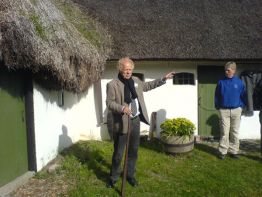Project Aim
The main aim of the project was to initiate a process to set guidelines for sustainable tourism destinations and to help regions overcome current social, economic and environmental constraints through the exploration and adoption of relevant policies and good practice.
Project implementation and results
Spatial development
A regional SWOT analysis of sustainable tourism has been carried out in all partner regions. The CREST work has been developed from the viewpoint of the destinations, based on the principle of local planners working together with local residents. While each destination has different priorities, all of them share a number of common problems, such as the huge influx of visitors during a relatively short summer season and the consequent seasonal infrastructure overload. All of the partners involved are close to, or within, areas of natural beauty, which can easily be damaged by over use and exploitation.
Activities
For a destination to be sustainable, other basic issues had to be dealt with, such as the provision of affordable housing for local people, the creation of job opportunities all the year round and the encouragement of young people to stay.
The main outcome of the project was the “CREST Toolkit with Recommended Actions for Creating a Sustainable Tourism Destination”, illustrating the results of the project and good practise examples.
Joint transnational strategy
One of the main achievements of the transnational work was a joint definition of sustainable tourism destinations as such and to identify the factors for becoming a sustainable tourism destination. Therefore contacts with representative from European Commission and Tourism Sustainability Group to develop the CREST work in connection with recommended guidelines have been very valuable.
Impact of the project
Policy shaping
In all partner areas there have been discussions and agreements with politicians, participating at the CREST seminars and conferences. The agreements have been about that the project results mainly will go in to the area planning work for the destinations.
The findings in CREST will be used in local work, but interest in national levels has been shown in all countries, by different bodies. The CREST project was also presented during the European Day of Tourism on the 7th of October 2008 at the Open Days European Week of Regions and Cities in Brussels.
Dissemination
The target groups for the toolkit were local community workers in cooperation with tourist organisations, business associations and influential stakeholders ranging from local politicians to EU politicians and other policy makers. The work of the CREST project, including the toolkit, will be available on the webpage www.crestproject.com until 2010. |

Importance of local guides, Læsø (DK)
Partners Municipality of Læsø, DK
Municipality of Hvaler, NO
Municipality of Strömstad, SE
Keep Sweden Tidy Foundation, SE
Whitby Beacon Town Forum, UK
Orkney Boat Museum, UK
LP:
Länsstyrelsen Västra Götaland
Project Manager
Linda Carlsson and Marie Pehrson
Länsstyrelsen Västra Götaland S. Hamngatan 3
S-403 40 Göteborg
Sweden
linda.carlsson@o.lst.se marie.pehrson@o.lst.se
www.crestproject.com
Tel: +46 31 605 085
Measure: 3.2
Start Date: 30 November 2005
End Date: 30 April 2008
ERDF Grant:
 232.500,00 232.500,00
Total Eligible Sum:
 465.000,00 465.000,00
|